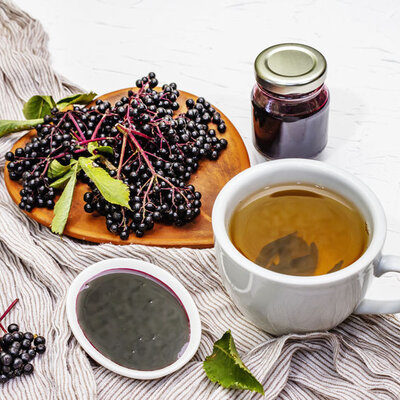
Elderberry Tea
What is Elderberry Tea?
Elderberry tea is a type of herbal tea made from the Sambucus plant. This plant stems from the flowering plants of the Adoxaceae family and includes various species referred to as elder or elderberry. The elderberry bush has small white elderflowers with bunches of dark purple berries.
- Elderberries commonly grow in warmer regions of Europe, North America, Asia, and Northern Africa.
- Elderberry tea is often consumed for its purported health benefits such as relief of flu and cold symptoms.
The most common elderberry cultivars include:
- Beauty
- Black Lace
- Adams #1
- Adams #2
- Johns
- Nova
- Variegated
- Scotia
- York
Origin of elderberry tea
The elderberry plant has been traced back to the Ice Age sometime between 12,000 and 9,000 BCE. Seeds from this plant are thought to have been deposited by receding glaciers across North America, Europe, and Asia. Elderberry seeds were also found in Neolithic pole-dwellings located in Switzerland that date back 4,000 years. Records indicate that ancient civilizations, including the Greeks and the Romans, used this plant as medicine.
In fact, the plant’s scientific name Sambucus comes from the Greek word “sambuca”. However, it’s believed that the English word for this plant originates from Middle English or High German word “alder” which was commonly used in the 12th century. In 1644, a book written by Martin Blockwich entitled The Anatomie of the Elder, described all of the medicinal benefits of elder. Nowadays, elderberries are still consumed for their health benefits with one of their most popular forms being tea.
Nutrition
One tea bag of elderberry tea contains:

Elderberries and their tea contain beneficial vitamins and minerals. These berries have also been shown to provide antioxidant and antiviral properties. Another study showed that elderberries helped participants overcome their flu-like symptoms. This plant also shows promise in treating skin conditions.
However, elderberries can have some side effects, if consumed raw. Raw elderberries, as well as the seeds, leaves, and bark of the tree, contain a mildly toxic substance. Consuming raw elderberries or the other toxic parts of the plant can lead to nausea, vomiting, and diarrhea. Avoid consuming this plant raw and instead opt for dried elderberry tea or elderberry syrup.
Commercial Production
The commercial production of this fruit tea begins with collecting elderberries. Then, the plant material is transported to a factory for sorting, washing, and disinfecting. Next, the berries are dried and packaged. If the tea is distributed in tea bags, there is an additional step of grinding which happens before packaging. Finally, the elderberry tea is shipped off for distribution.
Uses
To enjoy this tea to the fullest, be sure that the elderberries are properly stored. Elderberries can be air or oven-dried for long-term storage. Once the berries are fully dry, place them in an airtight container in a cool, dry, and dark place. It’s also possible to freeze elderberries if you need more time to process or dry them by placing them in a ziplock bag. For already made elderberry tea, simply place the tea in a mason jar and keep it in the refrigerator.
Elderberry tea recipes
This fruit tea is a traditional hot beverage. Here are some popular recipes:
- Elderberry Tea
- Elderberry Blossom Tea
- Elderberry Iced Tea
- Hibiscus Elderberry Ginger Tea
- Elderberry Syrup
FDA Regulation
The Food & Drug Administration has no current regulations regarding elderberries. Nonetheless, the FDA regulates the polymers used in tea bags or infusers. All other aspects of herbal tea production such as importation and packaging are strictly regulated by the USDA. Furthermore, the USDA regulates instant tea mixes, which include decaffeinated, black, or green teas.
References
“European Elder.” Nccih.nih.gov, National Center for Complementary and Integrative Health, 1 Aug. 2020, www.nccih.nih.gov/health/elderberry.
“Elderberry.” Herbsociety.org, An Herb Society of America, www.herbsociety.org/file_download/inline/a54e481a-e368-4414-af68-2e3d42bc0bec.
Luttjohann, Bobbi. “Exceptional Elderberries.” Permaculturenews.org, The Permaculture Research Institute, 6 Nov. 2017, www.permaculturenews.org/2017/11/07/exceptional-elderberries/.
Barrell, Amanda. “Elderberry: Health Benefits, Uses, and Risks.” Medical News Today, MediLexicon International, 9 Oct. 2018, www.medicalnewstoday.com/articles/323288.
